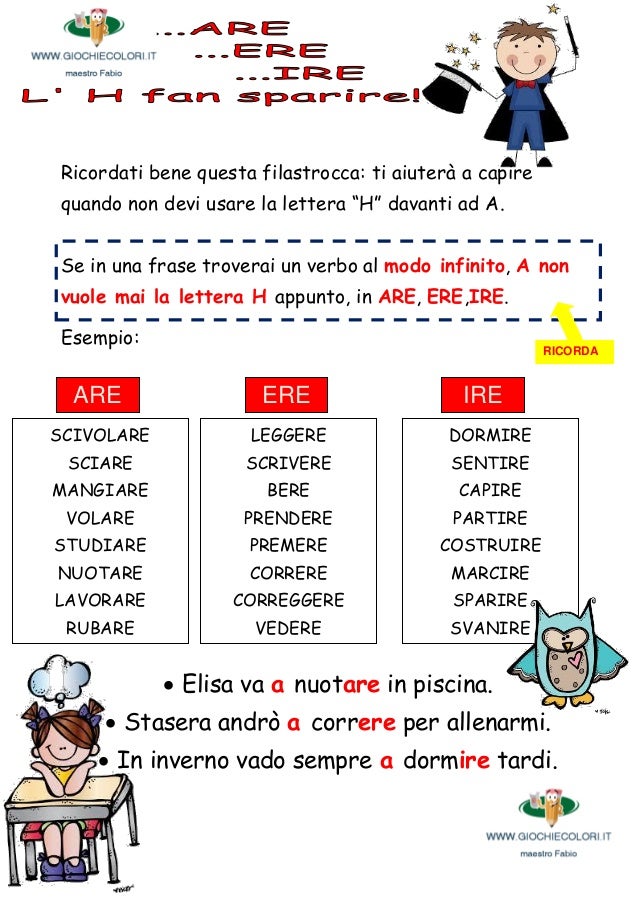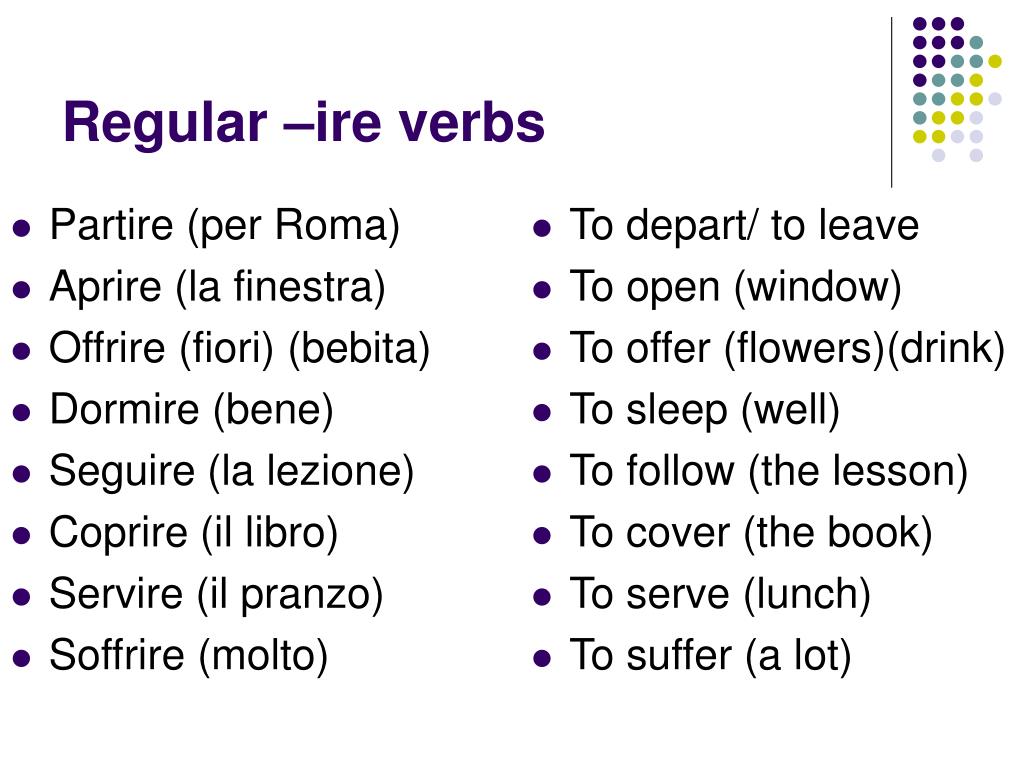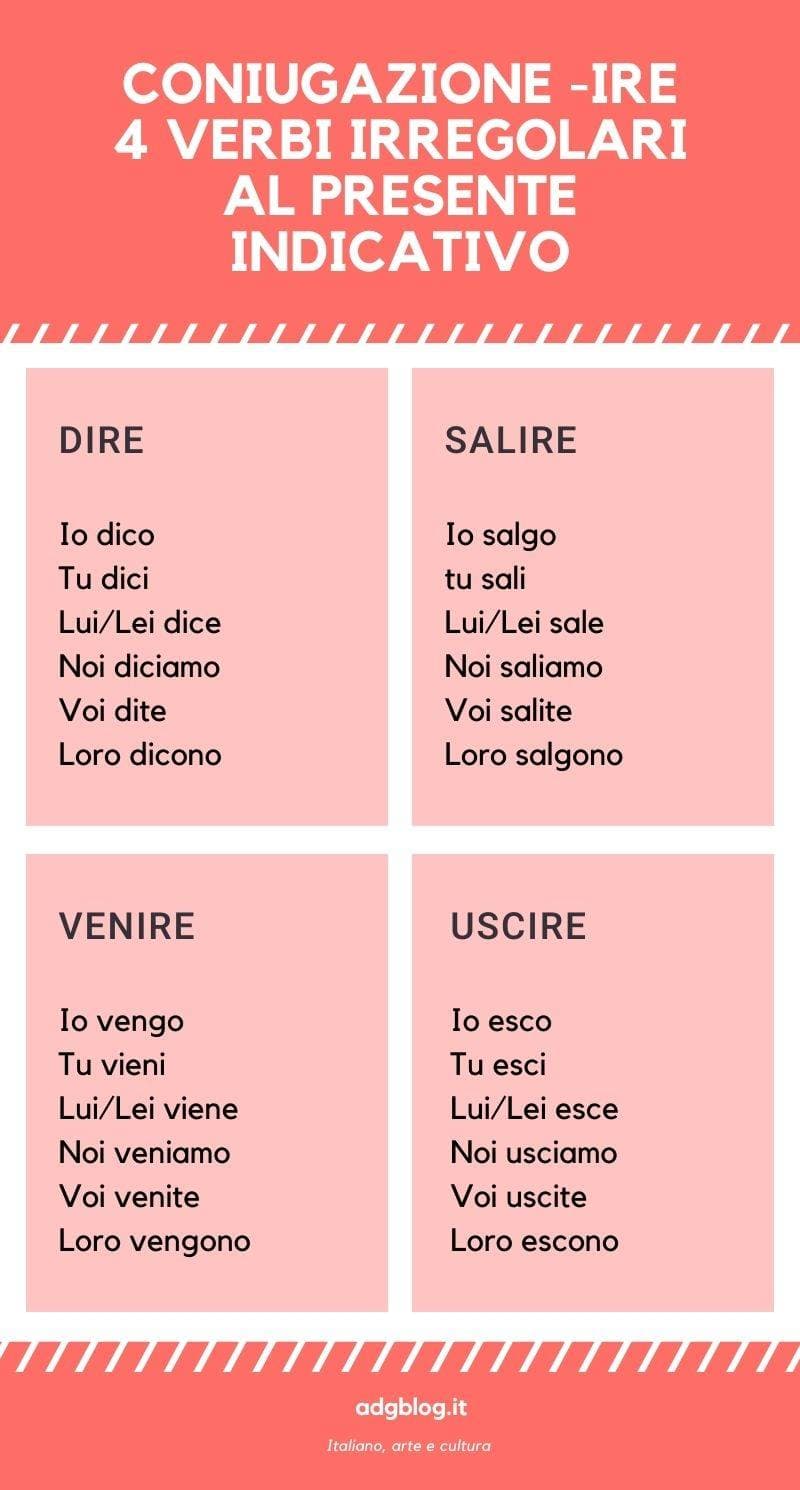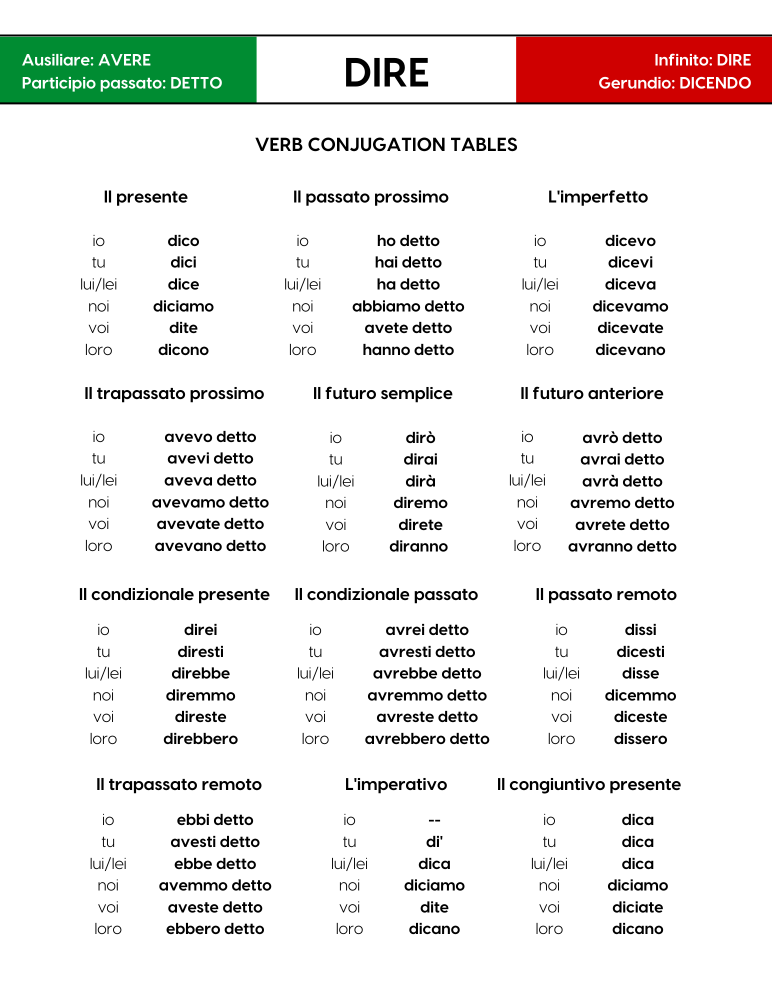Terza coniugazione verbi in ire

Il Verbo avere schede didattiche, regole ed esercizi del maestro Fab…
sentire : to hear Start with third conjugation verbs, which are verbs with infinitives ending in -ire. They're also more simply called -ire verbs. -Ire Verbs in Italian The present tense of a regular -ire verb is formed by dropping the infinitive ending (-ire) and adding the appropriate endings to the resulting stem.

PPT Conjugating ire Verbs PowerPoint Presentation, free download
SPUNTI: Italiano Elementare 1

Il presente indicativo dei verbi in ire (primo gruppo) Adgblog
Italian Ire Verbs List Most-Used IRE Verbs in Italian Venire: To come; arrive; to come from; to turn out; to come up; to cost; to send for or call Vieni a trovarci - Come and see us! Non sono ancora venuto - They haven't arrived yet. Dire: To say; to tell; to mean; to recite; to admit; to think Come si dice in spagnolo?

The Italian Verb Files Dire The Happy Maple Language Co
The most common -ire verbs that require the insertion of -isc-are: agire (to take action), capire (to understand), colpire (to strike), costruire (to build), definire (to define), finire (to finish), gestire (to manage), guarire (to cure), inserire (to insert), obbedire (to obey), preferire (to prefer), pulire (to clean), restituire (to return/restore), spedire (to send/ship) and suggerire (to.

Pag 17 Coniugazione ire (ir en español) sentire, dormire, partire
Coniugazioni verbali non-finite non finito infinitive infinito present participle participio presente past participle participio passato gerund gerundio indicative

Pin by Marie Christine on Italian Learning italian, Italian words
You form the imperfect tense of regular -are, -ere and -ire verbs by knocking off the -re from the infinitive to form the stem of the verbs and adding -vo, -vi, -va, -vamo, -vate, -vano. The following tables show the imperfect tense of three regular verbs: parlare (meaning to speak), credere (meaning to believe) and finire.

(la coniugazione del verbo IRE) Coggle Diagram
Italian verbs have a high degree of inflection, the majority of which follows one of three common patterns of conjugation. Italian conjugation is affected by mood, person, tense, number, aspect and occasionally gender.. The three classes of verbs (patterns of conjugation) are distinguished by the endings of the infinitive form of the verb: . 1st conjugation: -are (amare "to love", parlare "to.
CONIUGAZIONEVERBIindicatpartgeruninf coniugazione dei verbi
Verbs with infinitives ending in -ire are called third conjugation, or -ire verbs. The present tense of a regular -ire verb is formed by dropping the infinitive ending -ire and adding the appropriate endings to the resulting stem. There is a different ending for each person. See the table below for a sample conjugation of partire (to leave).
Terza coniugazione verbi in ire
Verbo ire - Coniugazione italiana Coniugazione alternative Coniugazione del verbo italiano IRE Esporta in Word Indicativo | Congiuntivo Condizionale Imperativo | Infinito | Gerundio | Participio Indicativo Presente io isco tu isci lui isce noi iamo voi ite loro iscono Passato prossimo io sono ito tu sei ito lui è ito noi siamo iti voi siete iti

VERBI IN IRE Maestra Giulia
Thu, 07/22/2021 - 05:45 In our previous articles, we've learned how to conjugate Italian verbs ending in -are and ending in -ere, and have reviewed their regular and irregular forms. This time we're going to look at the verbs with an infinitive ending in -ire and their conjugation. Table of Contents Regular -ire Verbs Irregular -ire Verbs

coniugazione al modo Indicativo dei verbi in ARE, ERE e IRE YouTube
Verbs ending in -are, -ere, -ire in the present tense The present tense indicates activities that you normally do, i.e.: canto in un coro [I sing in a choir].In Italian the present tense also indicates: Activities that are taking place right now, i.e.: mangio un panino [I'm eating a sandwich]. Activities that will take place in the near future, i.e.: domani parto per la Svezia.

Verbi IRE (isc) italiano Gioco di sette famiglie
5 Regular VERBS in Italian in "IRE" - Present Tense (Dormire, Partire, Sentire, Aprire, Capire) Watch on Popular Italian Verbs (Ending in "IRE") The regular verbs in Italian are divided into 3 categories, depending on the way they end in the infinitive form. We call these three groups "coniugazioni".

CONIUGAZIONE VERBI ARE ERE IRE PDF
Type I - ARE. Type II - ERE. Type III - IRE. cantare sing. vedere see. sentire hear/listen. capire understand. io canto. io vedo: io sento: io capisco: tu canti. tu vedi. tu senti. tu capisci. lui/lei/Lei canta: lui/lei/Lei vede: lui/lei/Lei sente: lui/lei/Lei capisce. noi cantiamo. noi vediamo. noi sentiamo. noi capiamo. voi cantate. voi vedete. voi sentite. voi capite. loro cantano.

Verbi in Are Ere Ire
Lawless Italian is an official Lawless Languages site. Lawless Spanish Files: A1 - Beginning Italian conjugation lessons Next Articles - il, la, i, le, un, una, del, della, dei, delle Previous Meglio tardi che mai Italian verbs that end in -ire are divided into two groups, both considered regular.

Verbi In Are Ere Ire grinderworld
Most regular Italian verbs that end in - ire require - isc - in four of their conjugations (1st, 2nd, 3rd person singular and 3rd person plural). To conjugate them, remove the infinitive ending and then add one of the following verb endings:

15. Suffissi (sufijos) dei verbi in are ere ire all'imperfetto
N.B. Common expression with dire: dire bugie (to lie), dire la verità (to tell the truth). Uscire is used with the prepositions da, dal, dalla etc. when it means "to leave from" (Usciamo da scuola, dalla discoteca, dal cinema, etc.) and con when it means "to go out with" (Questa sera esco con gli amici di scuola).